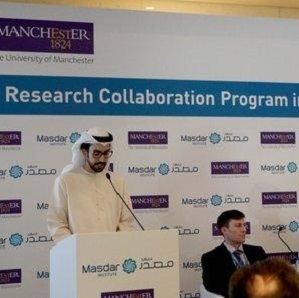The University of Manchester and Dubai's Masdar Institute of Science and Technology have partnered on a new research project they hope will yield insight into the uses of the carbon compound known as graphene.
Graphene is a one-atom thick layer of pure carbon. The research project will focus on exploring three specific uses for the compound: low-density graphene-based nano-composite foams for engineering, inkjet-printed graphene micro-sensors for energy and defense, and ion exchange membranes for desalination enabled by graphene.
University of Manchester Graphene Business Director James Baker said his school is looking forward to sharing and building upon the work of Manchester's 235-member graphene research team.
“Graphene has huge potential for applications in a large range of sectors, and we are delighted to be collaborating with the Masdar Institute of Science and Technology on these important areas of research," Baker said. “Our partnership with Masdar Institute is crucial to the commercialization of graphene and we look forward to seeing ground-breaking research and into developing exciting applications with potential industrial partners as a result of this activity.”
The new research will be conducted by faculty teams from each institution.
“The collaboration with the University of Manchester reflects Masdar Institute’s commitment to supporting the UAE’s innovation agenda for establishing knowledge-based industries that leverage materials advances," Steve Griffiths, Masdar Institute's vice president of research, said. "The projects cover a wide spectrum of applications, in which both universities have expertise. We believe the research program being launched will yield benefits for the UAE’s economic and strategic goals and ultimately achieve global impact.”
To that end, the two schools are also collaborating on an $85.2 million Graphene Engineering Innovation Centre expected to be finished in 2017. The institutions hope the big investment will boost graphene's path to the mass market, with items such as graphene light bulbs anticipated around the time of the center's opening.


 Alerts Sign-up
Alerts Sign-up